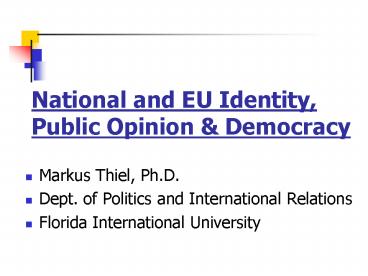National and EU Identity, Public Opinion - PowerPoint PPT Presentation
1 / 11
Title:
National and EU Identity, Public Opinion
Description:
Party Group. European. National. National. European. Local/Regional. Consequences for European ID? ... Democratic deficit (=lack of democratic input by citizens) ... – PowerPoint PPT presentation
Number of Views:63
Avg rating:3.0/5.0
Title: National and EU Identity, Public Opinion
1
National and EU Identity, Public Opinion
Democracy
- Markus Thiel, Ph.D.
- Dept. of Politics and International Relations
- Florida International University
2
Introduction
- Before EU, Europe as birthplace of modern
nationalism - Europeans today have many commonalities
- mixed economy welfare states
- common historical determinants
- common attitudes toward life
- Critical junctures of the Maastricht Treaty
provisions (1992/93) Euro, CFSP, citizenship - A dichotomy between EU supporters and opponents
visible ( e.g. with rejection of the
constitution/Lisbon Treaty, post-Maastricht
Blues and current identity crisis of the EU)
3
Identity as a social concept
- Diverse and often generalizing, undifferentiated
use of theoretical constructs such as collective
ID, nation - Matters on an individual and group level
- (Social) identity is essentially a categorization
framework made up of sets of comparisons and
contrasts used to emphasize distinctions among
groups (us against them)
4
Collective identities theorized
- 2 basic camps regarding the general logic of
identity-formation essentialists modernists - Essentialists/Primordialists (Connor, Smith)
Ethnic nationalism as an expression of the
eternal and essential constituents of collective
identities - sceptical about European Identity
- Modernists/Constructivists (Anderson, Gellner)
emphasize fluidity of ID, social learning
mobilization theorize civic nationalism as an
elite-driven project for nation-building - - optimistic about Eur Identity
5
Theory Literature
- European ID consists of cultural and civic
aspects of a pan-European common identification
(Bruter) - Cultural aspects/ID recognize(s) the common
history and cultural commonalities, though the
extent of this is disputed (McCormick) shared
heritage argument - Civic ID builds upon the Member States
liberal-democratic governance (HR, democracy,
welfare tolerance) and the EUs integration
measures (internal homogenization
differentiation)
6
Relationship of national European identities
(Nested, cross-cutting blended model)
7
Consequences for European ID?
- Blended model most appropriate one
- EU membership leads to an identity change which
impacts upon the previous national identity - Since EU membership identity then interacts with
rather different national identity constructions,
the overall effect will not be homogenous leading
to a generalized EU identity but rather, we find
(27) nationalized European identities - (different meanings of what Europe means in
different countries e.g. France, Germany, UK,
Ireland etc.)
8
Criticism
- Absence of popular support for the EU (only half
of EU-27 support membership and identify with the
EU) - Democratic deficit (lack of democratic input by
citizens) - Knowledge participation deficits (EP elections)
- Euronationalism, Superstate Europe
- Devolution Stateness problems
- Constitutional problems
- Important to recognize the idea and reality of
European identity, ideological component (Delanty)
9
(No Transcript)
10
Public opinion (EB 70, Fall 2008)
- The three main indicators covering the general
attitudes towards the EU the support for EU
membership (53) and the image of the EU (45)
have either remained stable or declined slightly
since 2006. - 2006 46 of citizens support further enlargement
of the EU in future years and 42 oppose it - For EU citizens, the three values which represent
best what the EU is, are human rights (38),
democracy (38) and peace (36).
11
The future of transnationalism democracy in the
EU
- The upcoming EP elections serve as signifier for
the degree of civic engagement with the EU its
pro/contra-position reg. EU the EP evolving into
a truly representative body? - Enlargements weakens the dominant
Anglo-Franco-German position but produces
disunity among institutions fears among EU
citizens broadening vs. deepening? - The Lisbon Treaty, rejected by the Irish who thus
block reform for the rest of Europe, aims at
balancing (more) supranational integration and
national interests strengthening of external
face an end of national vs. European interests? - (More) Democracy, Delivery, Diversity, Dreams
needed?































